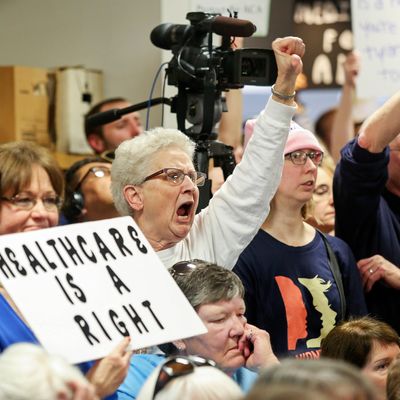
Last night, congressional Republicans came home to rooms full of angry people. At town halls across the country, conservative lawmakers were protested, heckled, and shouted at. A few unfortunate souls were even asked to explain — in detail — the GOP plan for replacing the Affordable Care Act.
But Republicans aren’t worried. They’re onto liberals’ cute little game. They’ve realized that these so-called “protests” are, in truth, tactical demonstrations — planned, in advance — by people who want to bring about political change.
At first blush, this tweet may seem like another eccentric outburst from our tweeter-in-chief. Why would anyone think that protests are illegitimate simply because they’re planned?
“The so-called March on Washington was actually, in numerous cases, planned out by civil-rights activists.”
And yet, this seems to be a genuine Republican talking point. Two days before Trump’s tweet, Texas senator John Cornyn shared a New York Post article that also tries to discredit the protests by claiming that they are strategically organized.
To be fair, “the protests are planned” is a considerably more honest line of attack than the “paid protesters” claim that preceded it. (Presumably, someone realized that if George Soros really were paying every anti-Trump protester, the liberal billionaire would be responsible for more job creation than the president).
And if you squint real hard at Paul Sperry’s Post column, you can see the makings of a point:
Organizing for Action, a group founded by former President Barack Obama and featured prominently on his new post-presidency website, is distributing a training manual to anti-Trump activists that advises them to bully GOP lawmakers into backing off support for repealing ObamaCare, curbing immigration from high-risk Islamic nations and building a border wall.
The manual, published with OFA partner “Indivisible,” advises protesters to go into halls quietly so as not to raise alarms, and “grab seats at the front of the room but do not all sit together.” Rather, spread out in pairs to make it seem like the whole room opposes the Republican host’s positions. “This will help reinforce the impression of broad consensus.” It also urges them to ask “hostile” questions …“Even the safest [Republican] will be deeply alarmed by signs of organized opposition,” the document states, “because these actions create the impression that they’re not connected to their district and not listening to their constituents.”
So, liberal activists are conscious of optics and, when possible, try to engineer an impression of widespread opposition via such nefarious tactics as “not all sitting together.”
It’s legitimate for conservative commentators and politicians to highlight these tactics. And, for many Republican House members, it’s probably true that town hall protests give a false impression of the scale of dissent in their red districts.
But there’s still a certain comedy to these complaints. The “training manual” Sperry stumbled upon was drafted by Indivisible – an organization that is not formally affiliated with Barack Obama or OFA – and has been proudly shared by Democrats and liberal activists over social media for months. The central charge of Sperry’s op-ed is that Organizing for Action is, in truth, an Obama-aligned front-group whose true purpose is … organizing for action.
Of course, the audiences at these town halls aren’t perfect representations of district-wide public opinion. And of course, professional political organizers are trying to channel liberal outrage in productive directions. This is how politics is practiced on both sides of the aisle. Earlier this month, the tea-party-aligned outside group FreedomWorks announced that it will be organizing rallies and town hall counter-protests in support of Obamacare repeal.
OFA’s “training manual” isn’t what’s unusual here. What’s unusual is the number of people eager to study it.
Activists do try to create an exaggerated impression of public support for their goals. But the more people they organize, the less hyperbolic that impression becomes.






























